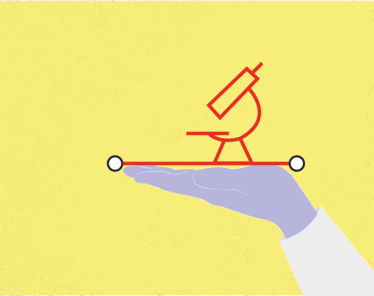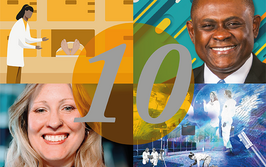
Tell Me, Doctor…
To keep pace with medicine’s future, pathologists need to develop much better communication skills – with great urgency
“The single biggest problem in communication is the illusion that it has taken place.” — George Bernard Shaw
“It is not what you say that matters but the manner in which you say it; there lies the secret of the ages.” — William Carlos Williams
Communication is everything – whether via a pathology report, a test result, a phone call or email to a colleague, a chance meeting with an administrator in the hall, or a conference room discussion. Communication is written words, eye contact, tone of voice, body language, dress and appearance, and much more – and it’s something all physicians should strive to improve. For pathologists – traditionally office-bound, glass slide-reading diagnostic physicians – improved communication is unquestionably the key to our future success in today’s evolving world of molecular medicine, team-focused patient care, and payment for quality.

We pathologists must become better communicators to meet our new responsibilities as more engaged medical team players. Indeed, it’s becoming increasingly obvious that our traditional approach to communication (primarily sitting in our offices generating electronic pathology reports and making the occasional phone call) is our likely path to failure as a profession.
Yet we resist even discussing how we might become better communicators. We seem to poke our heads out every now and then to point out the need to improve our professional communication skills, before sticking our heads back into the sand and hoping it will all just go away.
The issue won’t go away. But we might disappear. Right now, we are the physicians who hold intimate knowledge of the details of molecular diagnostics and immunotherapy testing; we are the experts in cancer staging; we are the authorities on the pathophysiologies of diseases. But our industry colleagues have become so frustrated with our reluctance – or even refusal – to engage with them that they are beginning to bypass us altogether. Instead, they take their testing questions and needs to interventional radiologists and treating physicians. According to other professionals with whom I’ve personally spoken, bypassing pathologists is quickly becoming a trend – a chilling circumstance that we need to begin changing right away.
Conversations with colleagues
Our resistance to fully addressing communication comes, I think, from a widespread sense of discomfort about the issue. Nobody wants to be considered a deficient or inferior communicator, and the idea brings about a vague sense of shame. Many of us even fear that we could become the subject of mockery if we openly confess to the elephant in the room: that we are not as skilled at communication as we ought to be. Professional communication is difficult, and it is hard to admit that it is difficult. And yet, our inability to interact effectively and efficiently with our patients, administrators, and non-pathologist physician colleagues is today’s greatest risk to our profession.
What do we need to do?
- Actively engage with the healthcare team and get a seat at the table with them when decisions are being made.
- Routinely and collegially interact with our non-pathologist physician colleagues and our administrators.
- Involve ourselves in patient decision-making.
If we don’t do these things, we will not be part of the future of medicine. It’s a strong assertion to make, but it’s one I truly believe – and we need to take equally strong action to remedy the situation. I don’t think it will be of any surprise to the majority of pathologists that communication is a problem, and yet we have not even begun to grasp the solution. Let’s use these concerns not to stoke fear, but to energize ourselves and other pathologists. The time for discussion is now.
Pathologists often talk about what we think our non-pathologist colleagues want but, all too often, we don’t hear what they actually need. Why? Because we are not talking to them. We interpret or divine among ourselves what we believe they need, often leaving them unsatisfied when we are wrong. These are our professional colleagues – people who want good relationships with pathologists – and they are frustrated when those relationships don’t happen. They fall all over themselves trying to communicate with us until, eventually, they give up, discouraged that they are not getting what they need. There’s only one way to fix this problem: we must speak to them. We need them to tell us what they want, what they expect, how well we are delivering our services to our patients, and what we can do to improve. Strong, focused conversations with our colleagues will help guide us in providing better patient care. We must develop better, necessary, expected, and appreciated communication skills; we really have no choice.
Finding time for culture change
Changing the way pathologists communicate will require no less than a cultural shift for all of us. Why? Because improving communication skills doesn’t just mean “talking more.” It isn’t limited to specific situations, such as when working intraoperatively with a surgeon. We are endeavoring to be efficient and effective professional communicators in any situation that may arise as we conduct our professional responsibilities. It’s not something pathologists are incapable of doing; a few days spent at any pathology conference will demonstrate just how communicative we can be in the right circumstances. Critically, what we need is more of our most precious resource – time.
Communicating successfully while still managing to allocate enough of our time to signing out cases or managing the laboratory is a significant, and often underestimated, challenge. To overcome it, we will have to change the way we spend our days – doubly hard given that we are currently paid for the behaviors and actions that have guided us into our traditional world of inefficient and infrequent communication. It’s a factor we can’t ignore as we step up our efforts to communicate in ways that don’t directly lead to payment. But it’s also a factor we must learn to overcome.
The problem cannot be solved by a couple of classes on how to talk to others. We need our best minds working on ways to achieve the necessary culture change – taking us out of our comfort zones without impacting our ability to get the (paid) work done. The balance can be achieved – some pathologists are succeeding exceptionally well. Now, we need them to share their secrets and act as role models to the rest of us.
Physicians first
In discussions with my pathologist colleagues, I’ve discovered that many of us see ourselves as just that – pathologists, rather than physicians. It’s vital for us to realize that, just like other medical professionals, we need to constantly work to be better communicators. In our non-pathologist physician colleagues’ world, it’s simply unheard-of not to speak with a patient – and that’s the mindset we pathologists need to adopt. If the expectation for other physicians is robust, direct, timely, and clear communication, then why shouldn’t it be the same for us? If other physicians are taught to communicate effectively during residency and beyond, then why shouldn’t we do the same?
Our jobs have changed significantly in recent years as science and technology have advanced by leaps and bounds. More and more, we practice “team medicine,” which means we need to interact with other doctors, nurses, bioinformaticians, geneticists, researchers… the list goes on. This brave new world into which we have been thrust can be disorienting, but it’s also given us the need – and the opportunity – to develop communication skills of the same professional level as our non-pathologist colleagues. Practice makes perfect; if we pay consistent attention to developing those skills, we will quickly become much more comfortable speaking with not only our professional counterparts, but with administrators, patients, and families as well. Soon, we’ll be having these interactions on a daily basis or even more often, just as our non-pathologist colleagues do.
We can no longer envision ourselves solely as laboratory dwellers, examining slides. Our prior communication training (or lack thereof, especially for older pathologists) did not prepare us for today’s communication needs. But let me repeat: those pathologists who cannot communicate and collaborate effectively will find it increasingly difficult – eventually even impossible – to be a meaningfully contributing member of the increasingly broad medical teams responsible for patient care.

A communication professional’s perspective
Patrick Smith is Professor of Family Medicine, Chief Faculty Affairs Officer, and School of Medicine Associate Dean of Faculty Affairs at the University of Mississippi Medical Center, Jackson, USA. He has a PhD in psychology with expertise in communication.
I propose that the discipline should reduce variability in communication patterns to ensure that all communication is precise, clear, concise, and timely. To improve, pathology needs to create curricula that focus on communication. Other disciplines have extensive experience in creating a curriculum as an infrastructure for the communication competency dimension within graduate medical education. Perhaps adapting curricula from other disciplines for application to pathology would be a way forward. It may sound daunting, but help is available; many family medicine and primary care departments hire behavioral science faculty to do (or at least assist with) this work. Good training leads to good communication, and good communication leads to good patient care!
The introversion myth
There is a widespread belief that many pathologists are introverted – one perpetuated through assumptions and jokes, some even told by pathologists themselves. We need to see this stereotype for what it is – a corrosive generalization that arose at least in part because of our discipline’s longtime lack of focus on our communication skills. The time is ripe now to step out of our comfort zones and erase that myth – for our patients’ sake and for our own. We must work together to teach our residents better communication skills, building upon what they learn as medical students; at the same time, we must assist our practicing pathologist colleagues who struggle to enter the new world of medicine. We must help those pathologists who have generally not spoken with patients nor actively and routinely communicated with non-pathologist physician colleagues and administrators – while remaining sensitive to their needs, experiences, and priorities.
Perhaps most importantly, we need to understand that focused mentoring or education in communication is nothing to be ashamed or embarrassed about – and certainly nothing to shy away from. We cannot let the introversion myth stop us or impact our participation in multidisciplinary medical care. In fact, we should embrace continuous communication training as a team. Even our role models – those pathologists who are already visible and interactive – could benefit from continuing education. Strong communication skills are taught in medical school, but in my experience, pathology residents have traditionally let those skills fall into disuse, as they have not been necessary for us to practice successfully as physicians. Forging communicative relationships and getting out of our comfort zones as pathologists means we must rethink who we are.
No shame, no blame
We must recognize that pathologists are not poor communicators by nature; we are simply out of practice in the professional sense. I expect that pathologists communicate as well as anyone else in everyday situations – with family and friends, while running errands, or even as patients! And I suspect that most pathologists were reasonably skilled communicators in medical school. Despite the stereotypes, most of us didn’t choose pathology because we lacked the ability or inclination to interact with others! Unfortunately, many of us have passively allowed our professional communication skills to wither from lack of use. If we make a point of starting to use them regularly, I anticipate that they will rapidly return and improve.
One thing I want to make extremely clear is that pathologists shouldn’t consider less-than-perfect communication a failing. Instead, we should acknowledge that it’s not a skill with which we are all equally comfortable – and when we hear other pathologists say things like, “I don’t want to talk to patients,” or, “I don’t feel comfortable speaking to colleagues,” we should encourage them to find ways of overcoming their discomfort. Risk managers will readily tell us that the biggest risk for medical malpractice among physicians is poor communication. We need to jump feet-first into the challenge of getting out of our offices and meeting our colleagues’ and our patients’ needs.
Our challenge is greater
Our non-pathologist physician colleagues communicate many times a day, often moment to moment, so even those less comfortable with it rapidly develop and maintain a good set of skills. As a result, improvement typically involves little more than “brushing up” on those skills. We, in contrast, must develop ours almost from the ground up. Our challenge is greater, but the principle remains the same: we are simply joining our colleagues on their quest for better communication.
To fully develop and maintain superior professional communication skills, we must use them frequently. Communicating well once every six weeks misses the mark. We must habitually communicate efficiently and effectively with the administrators in the C-suite, the surgeon in the operating theater, the nurse in the hospital room, and the patient in the clinic. We should build frequent practice into our communication goals – not every six weeks, but every six hours or even every six minutes.
Our charge is clear, and the risks of not heeding the call are just as clear. Pathologists have traditionally met every challenge that has arisen in our profession; this is merely the next in line. We should have every confidence that we can develop and maintain excellent professional communication skills – and we can start by talking amongst ourselves about it. We all know the names of pathologists who are strong advocates and advertisers of the discipline – so we should be asking them: how do you do it? What is your advice? How should we be talking to one another, to other health care professionals, to patients? In this way, we can progress in the brave new medical world from the “doctor’s doctor” to the “patient’s doctor.”
Who knows? One day soon, we could be the doctors whom others consider role models for professional communication!
Join in the conversation or submit a question to Timothy Craig Allen by using #PathComm and tagging us on Twitter @Pathologistmag - our author will be answering all questions on 5th September 2018 9:30am CT / 3:30pm GMT+1
Timothy Craig Allen is Professor and Chair of the Department of Pathology at The University of Mississippi Medical Center, Jackson, USA




















